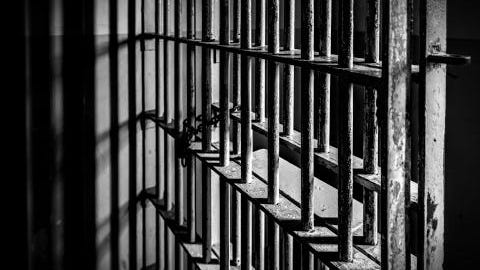On May 15, the US Department of Justice (DOJ) launched an investigation into Kentucky’s eight juvenile detention facilities and one “youth development center” run by the state’s Department of Juvenile Justice. The investigation follows continued reports of “excessive force by staff, prolonged and punitive isolation and inadequate protection from violence and sexual abuse,” according to the DOJ Civil Rights Division’s Special Litigation Section.
The federal investigation comes less than six months after former prisoners held in a juvenile detention facility filed a lawsuit detailing abuse, neglect and humiliation that they experienced at the hands of jail staff.
One of these cases was a 17-year-old girl who had spent much of the summer of 2022 locked inside a filthy isolation cell in unsanitary conditions, sometimes naked, while the jail staff ignored her cries for help and mocked her body odor.
The lawsuit stated that because she was “neglected for weeks, the girl grew increasingly confused and paranoid. She reached her hands through a narrow flap in her cell door and called out, ‘They are going to kill me.’”
The rampant abuse within the state’s juvenile justice system has been documented for nearly a decade with repeated investigations, state audits and outcry by youth advocates, often met with platitudes by state legislators and officials.
Meanwhile, former jail and nursing staff at these facilities have experienced retaliation for whistle-blowing about the inhumane and dangerous mistreatment of children in custody. In 2023, there were three different occasions when this occurred.
In January of this year a state audit revealed systematic abuse within Kentucky’s juvenile detention facilities. The report, “Juvenile Justice Performance Assessment of Facilities,” was only initiated due to a series of assaults, escapes and riot situations in these brutal, overcrowded prisons.
The audit found facilities had not implemented protocols recommended back in 2017. Those protocols called for “better security and medical staffing, on-site mental health care and less use of solitary confinement for the teenagers in its custody.”
Kentucky presently operates eight prisons designed to house young people throughout the state, incarcerating around 163 per 100,000 youth a year. This is more than double the national average of 74 per 100,000. Though the number of incarcerated youths has followed a decreasing national trend, the “intake” numbers demonstrate a sharp increase between 2021 (1,861 detainees) and 2022 (3,044 detainees) as pandemic policies were ended.
A large portion of incarcerated youths in Kentucky are considered “status offenders,” charged with minor and age-specific violations like truancy, or they have run away from home. On average, they spend about a week in custody, although there are many more who have been locked up for a month or more in pre-trial detention.
Many of these children are not considered to be “significantly more violent” nor are they a “danger to society.” In reality, they are victims of a cruel social order that has produced mass poverty, a raging opioid epidemic, and destroyed the basic safety net.
None of the investigations or policy proposals by state or federal agencies are capable of addressing the role, let alone the underlying causes, of mass incarceration in contemporary American society. In launching the federal investigation, Assistant Attorney General Kristen Clarke commented: “Confinement in the juvenile justice system should help children avoid future contact with law enforcement and mature into law-abiding, productive members of society. Too often, juvenile justice facilities break our children, exposing them to dangerous and traumatic conditions.”
By “productive members of society,” the Justice Department expresses the concerns of the Biden administration and the entire political establishment that many in an entire generation of young people are not integrated into the capitalist profit system or the war machine. These children have been raised in an age of continuous war, unprecedented inequality, police violence and the destruction of public schools and other social infrastructure. Poor youth are expected to either enlist in the military or condemn themselves to low wages shoveling the furnaces of Amazon, Walmart and other corporations helmed by billionaires.
For his part, Democratic Kentucky Governor Andy Beshear has dismissed the investigation into juvenile prisons as a “political tool” used by the Republican-controlled state legislature, after the State Auditor of Public Accounts said a “lack of leadership” in the governor’s office was to blame for the way these facilities had been run.
Despite the divisions between the Democrats and Republicans, the ruling class in Kentucky is united in preventing any substantial change in the juvenile justice system. Even cosmetic reforms to the prisons have been blocked. Senate Bill 242, which stalled in the House, would have put $165 million into building three new detention centers, two to be designated as female only. It would have renovated existing facilities, including a 16-bed complex at Louisville’s Central State Hospital for “high acuity” youths most in need of mental health services.
Though SB 242 would have addressed funding issues in renovating existing facilities and separating female and male youths, it would not have addressed the use of solitary confinement, which was used 1,579 times last year, or in nearly 200 cases per month. Nor would it address the violent use of force employed by jail staff by means of “chemical agents, tasers, and other security control devices.”
Instead of addressing the abuse or the long-term physical and mental impacts it has on young people, the state has sought to double down on being “tough on crime.” Most notably, through the “Safer Kentucky Act” signed into law in April, punishments have been stiffened for various crimes and homelessness is now a criminal offense.
This post was originally published on this site be sure to check out more of their content.














